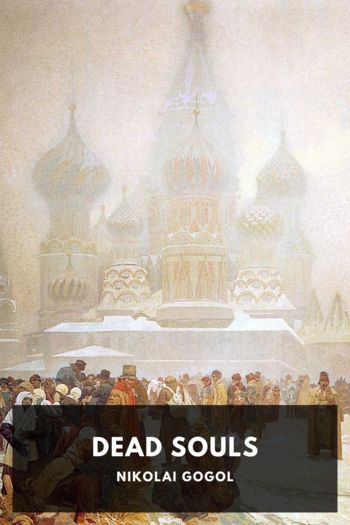Short Fiction - Nikolai Gogol (best selling autobiographies TXT) 📗

- Author: Nikolai Gogol
Book online «Short Fiction - Nikolai Gogol (best selling autobiographies TXT) 📗». Author Nikolai Gogol
“Enough, you’ve howled quite enough, old woman! A Cossack is not born to run around after women. You would like to hide them both under your petticoat, and sit upon them as a hen sits on eggs. Go, go, and let us have everything there is on the table in a trice. We don’t want any dumplings, honey-cakes, poppy-cakes, or any other such messes: give us a whole sheep, a goat, mead forty years old, and as much corn-brandy as possible, not with raisins and all sorts of stuff, but plain scorching corn-brandy, which foams and hisses like mad.”
Bulba led his sons into the principal room of the hut; and two pretty servant girls wearing coin necklaces, who were arranging the apartment, ran out quickly. They were either frightened at the arrival of the young men, who did not care to be familiar with anyone; or else they merely wanted to keep up their feminine custom of screaming and rushing away headlong at the sight of a man, and then screening their blushes for some time with their sleeves. The hut was furnished according to the fashion of that period—a fashion concerning which hints linger only in the songs and lyrics, no longer sung, alas! in the Ukraine as of yore by blind old men, to the soft tinkling of the native guitar, to the people thronging round them—according to the taste of that warlike and troublous time, of leagues and battles prevailing in the Ukraine after the union. Everything was cleanly smeared with coloured clay. On the walls hung sabres, hunting-whips, nets for birds, fishing-nets, guns, elaborately carved powder-horns, gilded bits for horses, and tether-ropes with silver plates. The small window had round dull panes, through which it was impossible to see except by opening the one moveable one. Around the windows and doors red bands were painted. On shelves in one corner stood jugs, bottles, and flasks of green and blue glass, carved silver cups, and gilded drinking vessels of various makes—Venetian, Turkish, Tscherkessian, which had reached Bulba’s cabin by various roads, at third and fourth hand, a thing common enough in those bold days. There were birch-wood benches all around the room, a huge table under the holy pictures in one corner, and a huge stove covered with particoloured patterns in relief, with spaces between it and the wall. All this was quite familiar to the two young men, who were wont to come home every year during the dog-days, since they had no horses, and it was not customary to allow students to ride afield on horseback. The only distinctive things permitted them were long locks of hair on the temples, which every Cossack who bore weapons was entitled to pull. It was only at the end of their course of study that Bulba had sent them a couple of young stallions from his stud.
Bulba, on the occasion of his sons’ arrival, ordered all the sotniks or captains of hundreds, and all the officers of the band who were of any consequence, to be summoned; and when two of them arrived with his old comrade, the Osaul or sub-chief, Dmitro Tovkatch, he immediately presented the lads, saying, “See what fine young fellows they are! I shall send them to the Setch33 shortly.” The guests congratulated Bulba and the young men, telling them they would do well and that there was no better knowledge for a young man than a knowledge of that same Zaporozhian Setch.
“Come, brothers, seat yourselves, each where he likes best, at the table; come, my sons. First of all, let’s take some corn-brandy,” said Bulba. “God bless you! Welcome, lads; you, Ostap, and you, Andrii. God grant that you may always be successful in war, that you may beat the Musselmans and the Turks and the Tatars; and that when the Poles undertake any expedition against our faith, you may beat the Poles. Come, clink your glasses. How now? Is the brandy good? What’s corn-brandy in Latin? The Latins were stupid: they did not know there was such a thing in the world as corn-brandy. What was the name of the man who wrote Latin verses? I don’t know much about reading and writing, so I don’t quite know. Wasn’t it Horace?”
“What a dad!” thought the elder son Ostap. “The old dog knows everything, but he always pretends the contrary.”
“I don’t believe the archimandrite allowed you so much as a smell of corn-brandy,” continued Taras. “Confess, my boys, they thrashed you well with fresh birch-twigs on your backs and all over your Cossack bodies; and perhaps, when you grew too sharp, they beat you with whips. And not on Saturday only, I fancy, but on Wednesday and Thursday.”
“What is past, father, need not be recalled; it is done with.”
“Let them try it know,” said Andrii. “Let anybody just touch me, let any Tatar risk it now, and he’ll soon learn what a Cossack’s sword is like!”
“Good, my son, by heavens, good! And when it comes to that, I’ll go with you; by heavens, I’ll go too! What should I wait here for? To become a buckwheat-reaper and housekeeper, to look after the sheep and swine, and loaf around with my wife? Away with such nonsense! I am a Cossack; I’ll have none of it! What’s left but war? I’ll go with you to Zaporozhe to carouse; I’ll go, by heavens!” And old Bulba, growing warm by degrees and finally quite angry, rose from the table, and, assuming a dignified attitude, stamped his foot. “We will go tomorrow! Wherefore delay? What enemy can we besiege here? What is this hut to us? What do we want with all these things? What are pots and pans to us?” So saying, he





Comments (0)